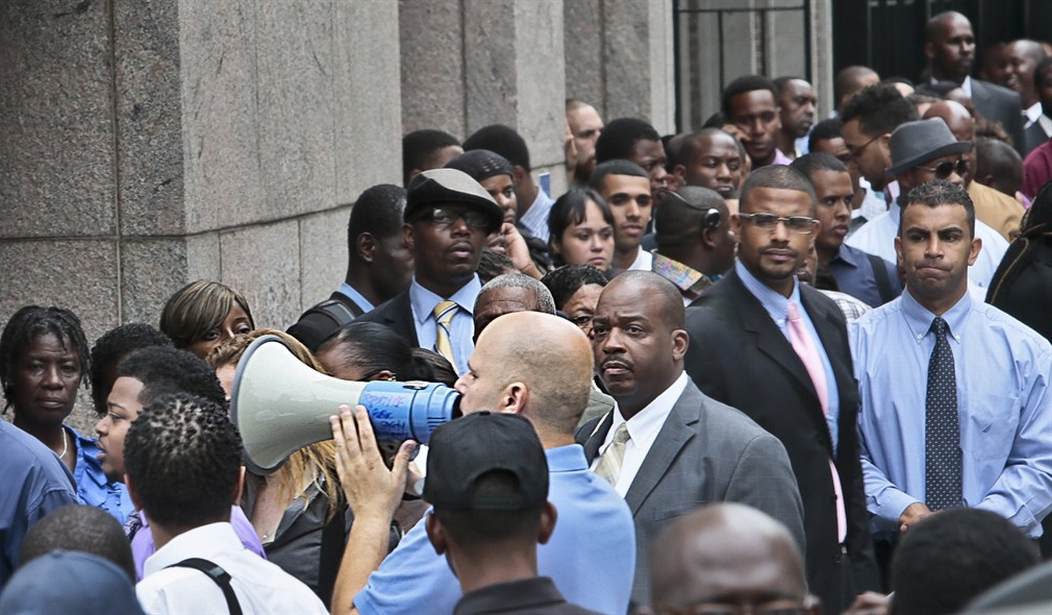Thanksgiving is a time when we express our gratitude to the Almighty for the many blessings bestowed on our country and its people.
But, sadly, this is also a time of severe economic anxiety and fear for many Americans who are still struggling in this persistently weak economy to earn a living and make ends meet. A time when many more people now say "they worry a lot" about losing their job in the Obama economy, not to mention the long-term unemployed who are still looking for work in an economy where jobs are in short-supply.
These are the results of a new survey that has yielded some deeply disturbing findings on this Thanksgiving that should fuel new debate about the president's policies and programs that have failed to revitalize our once-mighty economy.
This is a time when our country and its leadership at all levels of government need to begin refocusing on why our economic performance remains shamefully weak and sub-par four years after the recession supposedly ended.
At the highest level of our government, President Obama rarely talks about the economy's enduring weakness, and has given up on improving its fundamentals -- because he hasn't a clue about what is needed to make that happen.
On Capitol Hill, you can search in vain for a Democratic leader who is angry that, as Obama nears the sixth year of his presidency, 11 million Americans are still unemployed, and millions more are underemployed, working part-time, or fewer hours at less pay, as wages flatline.
Stories about the economy's underlying weaknesses are a rarity on the network news shows. The highly-paid news anchors, reporters and producers in New York, no matter how bad things have gotten, all too often give that subject short-shrift or avoid such unpleasant subjects altogether.
Recommended
All too often, they gush over minuscule numbers that they say purportedly show the economy is doing better, but very often ignore the bad numbers or play them down.
But there were signs in some sectors of the news media that the economy was getting a deeper reexamination.
On Tuesday, The Washington Post ran a lengthy story on its front page, beneath this headline: "For low-wage workers, unprecedented anxiety", adding that "Many fear losing their jobs, poll finds."
The newspaper reported the dismal results of a recent national survey by the Post and the Miller Center (a public policy research affiliate of the University of Virginia). What it found is this:
"American workers are living with unprecedented economic anxiety, four years into a recovery that has left so many of them stuck in place. That anxiety is concentrated heavily among low-income workers...."
Among the poll's broader findings:
More than six in 10 workers say they worry they'll lose their jobs in this economy. Nearly one in three, 32 percent, said they worry "a lot" about being laid off -- a record high, the survey report said.
Notably, 54 percent of workers earning $35,000 or less said they now worry "a lot" about losing their jobs. That number compares to 37 percent of similarly lower-income Americans in 1992.
"Lower-paid workers also worry far more about making ends meet. Fully 85 percent of them fear that their families' income will not be enough to meet expenses," the Post reported.
Thirty-two percent told polltakers they worry all the time about making ends meet, "a number that has tripled since the 1970s."
The survey also dramatically revealed just how deeply Obama's economy has reduced household incomes: 40 percent of all workers said they either had their work hours or pay levels cut.
For workers making less than $35,000, that percentage jumped to 54 percent. It is 45 percent for those who earn between $35,000 and $74,999, and 27 percent for workers above $75,000.
These are dreary numbers indeed. But behind them are people who are suffering under Obama's poor leadership and failed policies over the past five years.
Other polls show that confidence in Obama's economy is eroding fast and his job approval polls are falling with it.
Gallup's polls show his job approval score averaged 40 percent for the week ending Sunday, though other surveys had it falling into the high 30s.
It is noteworthy that his approval rating has fallen to 39 percent among workers whose annual income is between $24,000 and $59,999. That shows he is losing his base of support, an ominous political sign for his party in the 2014 midterm elections.
"Barring any major reversal this week, Obama is on track to shed at least two points in November, another month in which problems with the Affordable Care Act's [Obamacare] implementation have dominated the news," Gallup reported Tuesday.
The monthly jobs count may be up slightly, "but for recent college graduates and older adults the situation is grim, and many working age adults have abandoned job searches," says University of Maryland economist Peter Morici.
"Even with more full time positions, the pace of job creation is well short of what is needed. About 360,000 jobs [per month] would lower unemployment to 6 percent, but that would require GDP growth in the range of 4 to 5 percent. Over the last four years, the pace has been a paltry 2.3 percent," Morici writes.
The outlook for economic growth isn't good. Pending home sales fell to a 10-month low in October as interest rates rise, incomes remain flat, retail sales are soft and employers are cutting their payrolls to avoid the costs of Obamacare's mandates.
Most economists are predicting slower economic growth in the fourth quarter.
Stronger economic growth is possible, but not with the Obama administration's present policies. Just four years into the tax cut- driven Reagan recovery, the economy was expanding at a nearly 5 percent annual rate. No one sees that happening under Obama's anti- growth and anti-job policies.
For millions of struggling Americans, this is going to be a very unhappy Thanksgiving.

























Join the conversation as a VIP Member